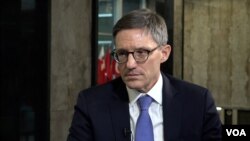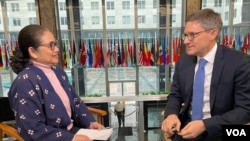The United States believes there is no chance that proposed elections in Myanmar will be free and fair, according to Derek Chollet, a senior adviser to Secretary of State Antony Blinken on Myanmar and other issues.
In an interview at the State Department on Thursday with Khin Soe Win, acting chief of VOA’s Burmese Service, Chollet also discussed the recently passed Burma Act, which provides for humanitarian assistance and civil society support to pro-democracy factions in Myanmar and imposes targeted sanctions on elements of the ruling junta accused of human rights abuses.
Other issues discussed included Russian support for the military junta that seized power in Myanmar, also known as Burma, in February 2020, and U.S. efforts to build support for Myanmar opposition forces such as the National Unity Government and People’s Defense Forces, and among Myanmar’s neighbors in the Association of Southeast Asian Nations.
The following transcript has been edited for length and clarity.
VOA: President Biden recently signed the National Defense Authorization Act, which includes the Burma Act, which is welcomed most Burmese people, particularly the resistance groups, as well as the National Unity Government and People’s Defense Force. But how effectively and how soon can you deliver this assistance to the targeted groups?
Derek Chollet, senior adviser to Secretary of State Antony Blinken: Well, first of all, we're already working — and we have been working over the last several years — to provide nonlethal assistance to the pro-democracy opposition inside Burma. We've been very engaged with the National Unity Government as well as some of the ethnic groups within Burma, talking to them about ways we could be most helpful in their efforts to put Burma back on the path to democracy. The Burma Act that was recently signed into law is something we in the Biden administration strongly support. We worked very closely with the Congress in the development of the Burma Act. It's something we welcome, and the fact that that was put into law in a bipartisan basis with both Democrats and Republicans working together shows the depth of support here in the United States for the people of Burma. [It also shows] the strong position we have against what the junta has done.
VOA: Yes, it's about $136 million. But compared to the U.S. assistance to Ukraine, it's just peanuts. But this is an encouragement for the resistance group as well as the moral support for the Burmese people who are under the military suppression.
Chollet: Yes, absolutely. And I think it's important to note the Burma Act is not the sum total of everything we are doing for Burma. Since 2017, the United States has provided nearly $2 billion in support to Burma, Bangladesh, the areas ... afflicted by this conflict. And we're going to continue to try to find ways that we can support the people of Burma and the pro-democracy opposition there.
VOA: The junta seems not to be winning in the fight against the People's Defense Forces and ethnic armed groups on the ground and focusing on air power. There are reports of some calling to impose a no-fly zone. Is it possible for the U.S. to coordinate with the U.N. Security Council on a no-fly zone?
Chollet: Well, that's not something we're considering now. What we're trying to find is a way that we can peacefully resolve the situation inside Burma. We strongly condemn what the junta has done and is doing every day. We fully support the efforts by ASEAN in particular to stick to the five-point consensus to ensure that Burma and the junta remain isolated within ASEAN and not being able to enjoy the benefits of membership in certain ways — certainly by not having political representation at key ASEAN meetings. When we held the U.S.-ASEAN summit here in Washington and President Biden met with nine leaders of ASEAN, there was an empty chair. And that was because Burma was not welcome at a political level at that meeting.
VOA: Back to NDAA and assistance for Burma, including the nonlethal assistance for armed resistance groups. Russia might retaliate against the U.S. because the Burmese junta was the very first to support the Russian invasion of Ukraine. Do you think Russia might react?
Chollet: We have seen over the last several years that the relationship between the junta and Moscow has only grown stronger. Russia is the biggest military supporter of the junta. It has been backing the junta in very significant ways. It's something we strongly condemn. And Russia is at a point right now where it's got very few friends in the international community, and it's found that the junta is one of the more reliable friends. That said, we were able to work with our partners in the U.N. Security Council to have a significant resolution passed, the first time the U.N. Security Council had spoken to the issue of Burma since the coup. Russia allowed that Security Council resolution to go forward. And so, we've shown that we can get some things done. But the reality is Russia and the junta are very, very close. I expect they'll remain that way. But that will only cause us to redouble our efforts to support the people of Burma, to work with our like-minded allies in the region and beyond to try to bring about a resolution to this crisis.
VOA: Neighboring countries are crucial for Burma. The military leader Min Aung Hlaing today met with the Thai army chief in the beach resort in Rakhine state. Thailand's role in the Burma crisis is critical because of the exodus of migrants to Thailand. When you visited Thailand together with Secretary Blinken last year, representatives of the National Unity Government and various armed ethnic organizations were not able to meet you because they feared Thai intelligence would find their location. So how do you assess Thailand's role in this conflict?
Chollet: Thailand shares a very, very long border with Burma and is quite concerned about the spillover effects of the instability. We fully understand that Thailand has been a critical partner of us for many, many years, and working to deal with the refugee crisis in Burma and all of its manifestations over decades. Now, we are very close partners and Thailand is an ally of the United States. Thailand is a key partner within ASEAN. So we're working very hard to stay close to our Thai partners as we're working together to try to resolve the situation inside Burma. It's something that we're doing also with our other ASEAN partners, because there's many countries with a lot at stake in Burma's future. And I think the one thing we have been able to accomplish in the years since the coup is by maintaining the strong unity — seeing the unity within ASEAN and then building unity between ASEAN and countries like the United States, Australia, the United Kingdom and others with an interest in a secure and peaceful and democratic Burma.
VOA: Secretary Blinken urged the international community to reject the sham elections that the junta is going to hold. And then yesterday the military spokesperson confirmed they are going to hold a National Security Council meeting at the end of this month, and they are going to set the election date. I don’t know how they are going to do it, because the military regime’s state of emergency expires at the end of this month.
Chollet: Look, our position hasn't changed. These elections have no chance of being free and fair. It's a transparent attempt to try to legitimize what the junta has done and try to create an offramp somehow for its coup. Our view is very simple. There was an election that was deemed free and fair. It was in November of 2020. The junta did not like the outcome of that election, which is why they did what they did on February 1, 2021. They don't control up to 50% of the territory right now. It's unclear how they could even hold elections. You can't have a free and fair election when you're jailing every significant opposition, when you're committing atrocities, when you're shutting down a free press. So, we should drop any pretense that if they were to hold an election— and they probably will try to hold one — that it would be free and fair.
This story originated in VOA's Burmese Service.





